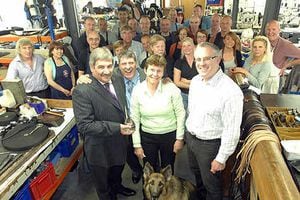Historic business scoops award
Walsall's folk made saddles for the world - but few in the world knew of its importance, for the town's saddlers hid their light beneath a bushel.

Professor CARL CHINN presents Jabez Cliff & Company of Walsall with an E&S Excellence in Manufacturing Award
Each year in the 1890s, a half a million pounds' worth of saddlery and harness was exported from Britain and the great bulk of it came from Walsall.
But because these goods were made mostly for the trade, few who bought them knew they came from the Black Country.
This month's award winners, Jabez Cliff & Company Ltd, maintain the great tradition and remain a big influence in the trade globally. Tanning of skins and hides was a major feature of Walsall from the later Middle Ages and by the mid-18th century the tanners were joined by a few curriers, who prepared tanned hides for use.
Still, as late as 1821 there were only 33 leather workers in the whole of Walsall.
This situation changed dramatically and quickly, so that by the 1860s over 1,000 men and women were engaged in the leather trades. Over the ensuing decades this sector rose in importance.
By 1900 the town had over 100 saddlery and harness companies which employed almost 7,000 people, whilst many others were employed in the light leather trade.
One of the pioneers of the leather trade was George Cliff. He and his wife, Elizabeth, lived in Badger's Yard in Park Street, where he made leather breeches in a small workshop behind his home.
They had had five children, four boys and a girl. In 1793 one of the sons, thirteen-year-old George, followed his father into the trade and began his apprenticeship in bridle preparing. In time his son, Jabez, carried on the family tradition.
Sadly Jabez Cliff, like so many people of his background, suffered pain throughout his life. His brothers and sisters all died in infancy and then in 1881, Jabez and his two sons, Samuel and George, lost their lives through typhoid.
His widow and daughter, showed their mettle in ensuring that the name of Jabez Cliff would live on.
Just eight years before his death, he had taken the big step of starting up his own saddlery business, Jabez Cliff & Co Ltd, in Portland Street, Walsall. The two women now took on the company and kept things going for a year or more until Mary, the daughter, married a highly skilled bridlemaker called Frederick Tibbits in 1882.
Their only son was Jabez Cliff Tibbits and he joined the business in 1902. It was a move that was crucial to the company's success for young Jabez was ambitious, energetic, and determined to get on.
And get on he did.
Near to the Cliff's workplace was the Globe Works of the world-renowned saddle-making company of J. A. Barnsby & Sons in Lower Forster Street. Just four years after becoming involved in his own firm, Jabez Cliff Tibbits made an audacious bid for Barnsby. His offer was accepted and the two companies amalgamated.
Jabez Cliff & Co Ltd Saddles retained the prestigious Barnsby label, whilst high quality bridles were manufactured under the Cliff name, thus creating the saddlery brand 'Cliff-Barnsby'. As with all saddlers in Walsall, their mainstay was the export trade - in their case mostly to Germany and Russia.
Both countries were embroiled in the tensions that would lead to the First World War and Jabez Cliff Tibbits was acutely aware of the problems these could pose for exporters.
He decided to diversify into other areas by manufacturing a range of sports products and leather goods.
Appointed as managing director in the early 1920s, Jabez Cliff Tibbits continued to encourage the growth of the business.
In that decade the company patented the innovative Globe non-tear football, which was used in four FA Cup Finals. During the Second World War he oversaw the shift to munitions work, with the production of bren gun pouches, ammunition belts, and leather goods for the Ministry of Defence.
He was Mayor of Walsall in 1939 and was re-elected for a second term the next year — following which he was made an alderman.
In 1948, King George VI knighted him for his services to Walsall. 'Sir Cliff' as he became known died in 1974.
His successors included the legendary Oliver Morton, who devoted 75 years to the company. He and others built upon the traditions of high quality, craft, customer care, and innovation. The company was honoured by the Queen in 1990 when it was awarded the Royal Warrant as Saddler and Loriner.
Seven generations on, descendants of George Cliff continue to run Jabez Cliff & Company Ltd. But with a celebrated reputation globally, the firm reaches out as successfully to civilian as well as military customers. It is one of the biggest saddlery businesses in the UK, and among the top five in the world.
Forward thinking attitudes mean that Jabez Cliff and Company Ltd eagerly adopt modern manufacturing techniques. That will be matched by a commitment to uphold the high standards that have held the firm in such good stead over two centuries.





